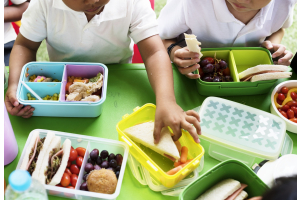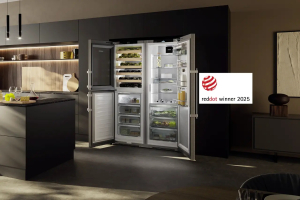
Ramadan is a time of spiritual reflection, prayer, and fasting. After a long day without food, everyone is welcome to join in the Iftar gatherings or share a meal with loved ones and/ or the community. It is essential to break your fast in a balanced way that replenishes your energy while maintaining your body’s nutritional needs.
Here’s a guide on how and what to eat for Iftar, so you can celebrate with family and friends while keeping your health in mind. We’ve also included a Pistachio Cake recipe you can simply bake in an oven.
5 Tips on How and What to Eat for Iftar

-
Start with Dates
It is quite common to see a bowl of dates and nuts on Iftar tables during Ramadan. Traditionally, the fast is broken with dates, and for a good reason. Dates provide a natural source of sugar, which helps to quickly stabilize blood sugar levels after fasting.
Having dates with a healthy fat source like nuts, will instantly energise you while slowing the absorption of sugar into your bloodstream. The combination of dates and nuts will help boost and sustain energy levels.
2. Enjoy Light Soups or Salads
Soups or salads are the ideal appetizer to break your fast for Iftar. Soups, particularly broth-based recipes, provide hydration and nutrients that can help ease your digestive system back into action. Consider options like lentil soup or a vegetable broth.
Salads are another refreshing and nutritious option with a good dose of fiber and vitamins. To prepare a simple salad, wash, then toss mixed greens with cucumber and tomato slices, and drizzle with olive oil and lemon juice.
3. Avoid Fried Foods
Fried foods that are quick to cook may be tempting when you haven’t eaten for a whole day, but it’s best to avoid them during Iftar. This is because fried food tends to be heavy, which may lead to digestive discomfort.
A lighter yet satisfying alternative to fried foods would be grilled, baked, or steamed dishes that are cooked with less oil. A freestanding cooker with built-in oven can help you save time preparing all the dishes for your Iftar food table. It will allow you to steam food on the stovetop and have a batch baking in the oven at the same time.
4. Skip Sugary Juices
Sweet, fruity juices can be irresistible after a long day of fasting, but many are high in empty calories and offer little in terms of nutritional value. Drinking water is still your best option to rehydrate your system.
If you’d like a hint of flavor, consider infusing your water with slices of lemon, mint, or cucumber and keeping it chilled in your refrigerator. You can also opt for herbal tea if you want to sip on something warm.
5. Be Mindful of Dessert Portions and Choices
Desserts are a delightful part of Iftar gatherings, but moderation is key. Opt for smaller portions — about the size of your palm to satisfy your sweet tooth without overindulging.
To keep your calorie and sugar intake in check, consider baked desserts that incorporate healthy ingredients. Examples include muffins or pies with fruits or nuts.

Pistachio Cake Recipe
If you’re looking to enjoy a delicious dessert without compromising your health, consider baking a Pistachio cake. Here’s an easy-to-follow recipe to try in your Elba oven:
Ingredients:
- 1 cup shelled pistachios (finely ground)
- 1 cup all-purpose flour
- ½ cup sugar (or a sugar substitute)
- ½ cup unsalted butter, softened
- 3 eggs
- 1 teaspoon vanilla extract
- 1 tsp baking powder
- A pinch of salt
- Optional: powdered sugar for dusting
Instructions:
- Preheat your Elba oven to 350°F (175°C).
- In a bowl, cream the softened butter and sugar until light and fluffy.
- Add the eggs one at a time, mixing well after each addition. Stir in the vanilla extract.
- In another bowl, combine the ground pistachios, flour, baking powder, and salt.
- Gradually add the dry ingredients to the wet mixture, folding gently until just combined.
- Pour the batter into a greased cake pan and spread evenly.
- Bake pistachio cake for 25-30 minutes, or until a toothpick inserted into the center comes out clean.
- Let the cake cool before serving. Optionally, dust with powdered sugar for a touch of sweetness.
Takeaways for Iftar During Ramadan
Breaking your fast during Ramadan should be a moment of joy and nourishment. Start with dates and healthy fats to stabilize your blood sugar, follow with a light soup or salad, and remember to avoid fried foods and sugary drinks. Desserts are allowed, but keep them small, and opt for healthier options like baked goods. Using an Elba oven can help ensure an even bake.
By following these tips, you can enjoy a delicious and healthy Iftar, enhancing both your physical and spiritual experience during this holy month.






